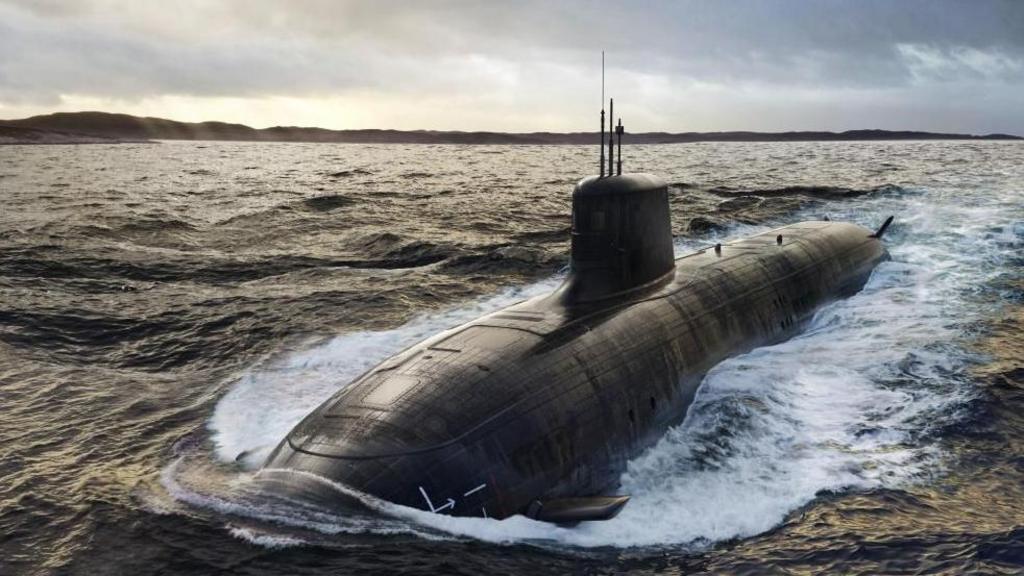The UK government will construct up to twelve new attack submarines, as announced by the Prime Minister, ahead of Monday’s comprehensive defence review.
These conventionally-armed, nuclear-powered submarines will succeed the seven-vessel Astute class, commencing in the late 2030s.
The review is poised to recommend that the armed forces transition to a heightened state of “warfighting readiness,” as a deterrent against escalating global threats.
Sir Keir Starmer articulated the government’s intention to prioritize NATO in its defence strategy, ensuring all initiatives bolster the alliance’s strength.
The review, commissioned by the current government last July, places significant emphasis on the threat posed by Russia, a key factor shaping its recommendations. Led by former Labour Defence Secretary Lord Robertson, it will present 62 recommendations, all of which the government is expected to adopt.
In an interview with BBC Radio 4’s Today programme, Sir Keir emphasized the undeniable threat of Russia, advocating proactive preparation as the most effective means of conflict deterrence.
The government has pledged to increase UK defence spending from 2.3% to 2.5% of national income by 2027—a move welcomed across the political spectrum, reflecting a growing consensus on bolstering military expenditure.
The Prime Minister, speaking at BAE Systems’ Govan shipyard, expressed full confidence in delivering the proposed plans—including £15 billion allocated to nuclear warheads and thousands of new long-range weapons—within existing budgetary frameworks.
However, pre-review discussions have been marked by political debate concerning the timeline for reaching the next spending milestone of 3% of national income.
While the government aims to achieve this by 2034 at the latest, the Conservatives advocate for completion by the end of the decade, a target that would necessitate an additional £20 billion annually.
Sir Keir conditioned his commitment to a specific timescale on demonstrable funding, calling any premature date “performative”.
Shadow Defence Secretary James Cartlidge urged caution regarding Labour’s review, pending clear evidence of sufficient funding.
The Liberal Democrats deemed Labour’s 2034 deadline “far too late”, suggesting an earlier date be explored through cross-party discussions. Their defence spokesperson, Helen Maguire, demanded concrete funding commitments to underpin the submarine announcement, citing unanswered questions regarding the project’s financial viability.
Further announcements within the review include:
Defence Secretary John Healey indicated no immediate plans to expand the Army’s overall size before the next general election, prioritizing the restoration of 73,000 full-time soldiers “in the next Parliament”.
The Astute class comprises the Royal Navy’s current fleet of nuclear-powered attack submarines, armed with conventional weaponry. Beyond protecting maritime task forces and gathering intelligence, they safeguard the Vanguard class submarines that carry the UK’s Trident nuclear missiles.
The sixth Astute-class submarine was launched last October, with the seventh and final vessel currently under construction.
Their successors, the SSN-AUKUS submarines, are being developed in collaboration with the Australian Navy under a 2021 agreement. The MoD anticipates a construction rate of one submarine every 18 months.
Construction of these submarines will take place at BAE Systems’ Barrow-in-Furness facility, with Rolls-Royce responsible for the nuclear reactors at its Derby site.
Modernization of Trident missile warheads is already underway, with the £15 billion investment securing the continuous-at-sea nuclear deterrent.
Sir Keir will reiterate Labour’s commitment to the Dreadnought class of nuclear-armed submarines, set to replace the ageing Vanguard fleet from the early 2030s.
The MoD’s Defence Nuclear Enterprise, comprising 20% of its budget, covers the construction of four Dreadnought-class submarines.
These announcements precede the publication of the strategic defence review on Monday.
Plan for gardens by an MoD office is inspired by Blackpool’s railway heritage.
Ernest Williams, 90, has been fighting for more than 40 years to get the pension he says he deserves.
Four crew and 25 passengers were killed when the helicopter crashed on the Mull of Kintyre in Scotland in June 1994.
At least six new factories will be built and up to 7,000 UK-built long-range weapons will be procured.

